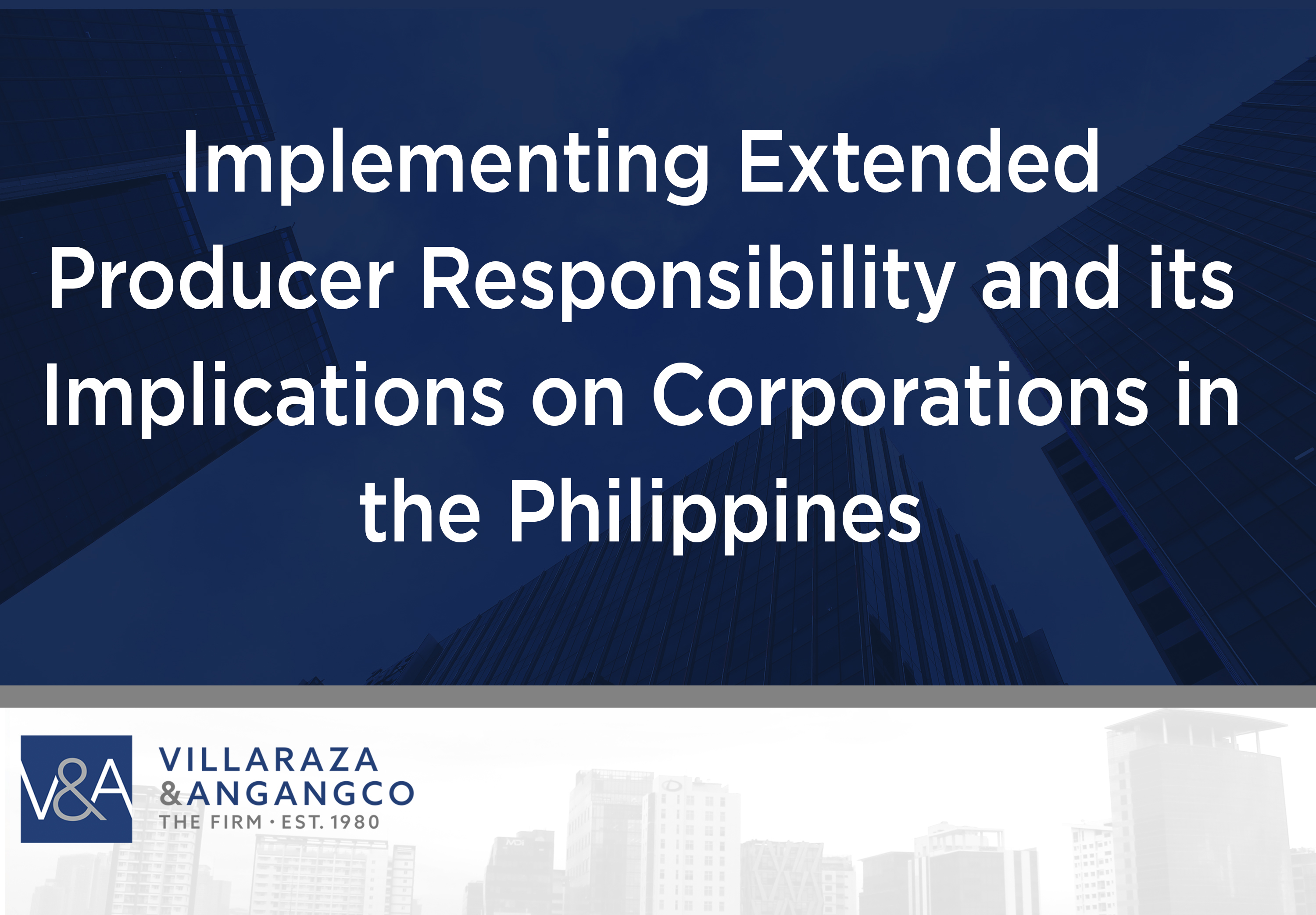

On 24 January 2023, the Department of Environment and Natural Resources (“DENR”) issued the Implementing Rules and Regulations of Republic Act (“RA”) No. 11898 or the Extended Producer Responsibility Act of 2022 (the “EPR Act”). The Act institutionalizes Extended Producer Responsibility (“EPR”) on plastic packaging waste and requires business entities to adopt and implement policies for the proper management of plastic packaging wastes.
The Act is widely considered to be timely given that the Philippines has been identified as one of the top plastic polluters globally, with a 2021 study by the World Bank revealing that the country’s current plastic production/consumption and solid waste management has resulted in 2.7 million tons of plastic waste generated yearly.
Notably, these problems have persisted despite a comprehensive set of national laws and policies which cover pollution and solid waste management. In particular, the EPR Act amended RA No. 9003 or the Ecological Solid Waste Management Act, which was created in an effort to adopt a systematic and comprehensive solid waste management program in the country.
The EPR Act lapsed into law on 22 July 2022 and became effective on 13 August 2022. As a result, the Philippines now joins other countries such as the United States, Australia, Japan, South Korea, and India in promulgating EPR.
Salient Provisions of the EPR Act and IRR
“Plastic packaging” as defined under the scope of the EPR Act includes: (a) sachets, labels, laminates and other flexible packaging products, both single-layer and multi-layered; (b) rigid plastic packaging (including containers for food, beverages, cosmetics and their coverings, necessities and labels); (c) plastic bags (including single-use plastic bags); and (d) polystyrene.
Product producers who are obligated to implement EPR under the scope of the Act refer to: (a) large enterprises that generate plastic packaging waste whose total assets exceed one hundred million pesos (PhP100,000,000.00); and (b) Micro, Small, and Medium Enterprises (“MSMEs”) where the total value of assets of all enterprises carrying the same brand, label or trademark exceeds that of medium enterprises under the Magna Carta for Small Enterprises. The Act also includes brand owners who sell or supply commodities, product manufacturers and importers. While not obligated, MSMEs that do not meet the asset threshold are encouraged to practice EPR voluntarily.
Obliged enterprises are mandated to establish or phase-in EPR programs for plastic packaging to achieve efficient management of plastic packaging waste, reduced production, importation, supply or use of plastic packaging deemed low in reusability, recyclability or retrievability, and plastic neutrality through efficient recovery and diversion schemes within six (6) months following the effectivity of the law. In complying with the Act, obliged enterprises have the option of voluntarily organizing themselves to form or authorize a Producer Responsibility Organization (“PRO”) for the purpose of establishing a viable platform to implement EPR programs.
Obliged enterprises must aim to meet the prescribed targets for the recovery of the plastic product footprint generated during the immediately preceding year. The target recovery rate for 2023 is twenty percent (20%), which shall be measured through the submission by the enterprises of reports of compliance along with appropriate documentation to the DENR. By 2028, obliged enterprises are expected to have achieved an eighty percent (80%) offset or recovery of their plastic product footprint.
While the EPR Act emphasizes the role PROs can play in implementing EPR programs and broadly describes the process for the formation of these organizations, the IRR does not provide for comprehensive guidance on the guidelines, procedures, and standards required to operationalize these PROs. Moreover, both the Act and IRR refer to only one waste management (1) target that must be achieved (i.e., the recovery of the plastic product footprint), despite there being multiple components for solid waste management systems. While not extensively discussed in the IRR, these issues may be more clearly addressed once the national framework is created and the National Ecology Center (“NEC”) is better mobilized.
Implications on Obliged Enterprises
The new law will ultimately require obliged enterprises to evaluate and manage their plastic waste generation long-term in order to comply with the EPR Act.
Enterprises that are compliant with the law are allowed to consider EPR expenses as necessary expenses that may be deducted from their gross income. However, the failure of an obliged enterprise to register an EPR program or meet the waste recovery targets shall be punishable by a fine ranging from Five Million (Php5,000,000.00) to Twenty Million Pesos (PhP20,000,000.00), depending on the number of infractions committed. For enterprises on their third offense, the penalty of automatic suspension of the enterprise’s business permit shall be imposed.
Further, in the event of enterprise’s failure to meet waste recovery targets, the enterprise shall pay the given fine, or an amount twice the cost of the recovery and diversion of the footprint or its shortfall, whichever is higher.
While still new, it will be interesting to see how obliged enterprises will comply with the Act. The introduction of PROs in implementing EPR programs can also be viewed with much enthusiasm, given that the formation of these organizations has seen much success in other countries implementing EPR laws such as South Korea. However, the success of the law will ultimately lie with the enterprises, given that the implementation of the law as it stands is private sector driven.